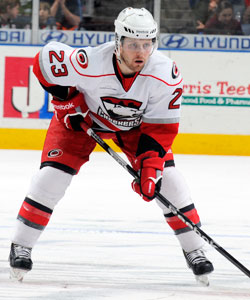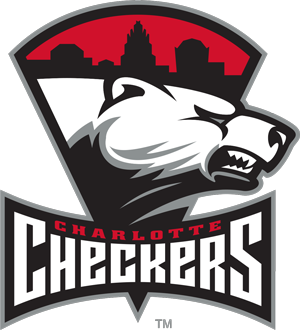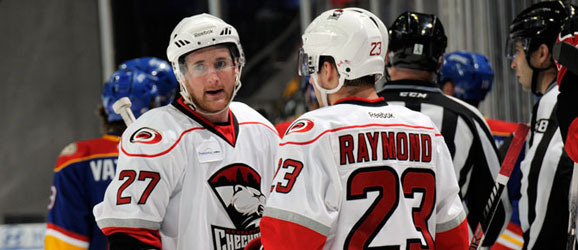It’s a question those players are accustomed to asking themselves at this time of year. Multi-season contracts at the AHL or ECHL levels are extremely rare, making it an annual quest to find a home at the highest level possible.
At 27 years of age, defenseman Bobby Raymond has been at it for longer than most. Since finishing a four-year career at the Rochester Institute of Technology in 2009 and playing the following season in France, he’s bounced back and forth between the ECHL and AHL, earning a full-time contract with Charlotte shortly after the NHL’s lockout concluded in January.

“Last summer was the most painful with the lockout,” said Raymond, an integral part of the Florida Everblades’ 2012 Kelly Cup team. “I thought last year I’d at least get an AHL one-way contract and teams showed interest that they would be willing to do that, but then with the lockout looming it backed off a bit.
“You go through those workouts in the summer where you’re getting to the point of pretty much puking, and sometimes you do, and you don’t even know where you’re going to play next year. You feel you deserve to be at the AHL level and there’s no solid offers coming. It’s a tough mental game that way.”
While the lockout took away his initial chance, causing him to sign an ECHL deal with the Everblades to start the season, it also gave him his break. His first recall came when the Checkers only had six defensemen for a road trip that featured three games in three nights at the end of December. As was the case throughout the lockout, Justin Faulk, the Carolina Hurricanes’ prized defenseman whose youth allowed him to spend the first part of the season with Charlotte, was not going to play in three consecutive games.
“It was essentially one game to make them reconsider whether they should keep me here, because I knew it was a possibility they’d be sending me back,” said Raymond.
The lockout ended one week later, and Raymond played in every single Checkers game after that, providing a puck-moving aspect that the team needed to cope with the losses of Faulk and Bobby Sanguinetti to the NHL and Marc-Andre Gragnani to injury.
“I’ve always played an offensive-style game, but Geordie pushed that even more on me,” said Raymond, referring to Checkers assistant coach Geordie Kinnear. “With my skating skills, jumping up in the play, being the fourth attacker and sneaking in back-door, it’s something that’s been easier for me but it’s pretty rare that you have a coach push that on you even more than what I naturally do. He taught me to pick my spots, and I felt I learned a lot and it showed down the stretch as I became more productive.”
Players like Raymond, who scored 11 points in his last 13 games played with Charlotte, arrived at different times throughout the season and under different circumstances, but many can tell a similar story. Forwards Matt Marquardt and David Marshall signed what could have been short-term tryout contracts in February and March, respectively, and stayed the rest of the season, as did Matt Beca, holder of a two-way AHL contract who saw extensive time on the team’s top scoring line. Goalie Rob Madore came up from Florida as an emergency backup and became the team’s playoff starter.
“I try to be up front and honest with these guys when they come up and say, ‘If you can make us better we’ll find room for you,’ and those guys did that,” said coach Jeff Daniels. “They earned the ice time, got a chance to play and showed they can play at this level.”
In all, eight players finished the season with Charlotte that were on either AHL or professional tryout contracts. One of those, Justin Soryal, has retired, while goalie Mike Murphy was something of a special case. Another, center Sean Dolan, is in the same situation but is also an example of how things can work out, having gone from emergency fill-in to regular member of the Checkers’ lineup over the last two seasons, earning a pair of AHL contracts.
Do the Checkers have room to bring back all six players? It will depend on how decisions on Carolina’s roster trickle down to Charlotte, as well as which Checkers regulars they choose to re-sign, and which emerging prospects are ready to compete for those jobs. On defense alone, Ryan Murphy, Danny Biega, Keegan Lowe and Austin Levi are expected to become full time pros next season. Additions at forward include Victor Rask and Brendan Woods. Brock McGinn, who made his debut as a 19-year-old late this season, will be too young to play in the AHL next season but would otherwise be firmly in that mix.
“It’s hard to judge what’s going to come as far as next year because there are so many guys coming out of college and junior and prospects that teams have signed, so you don’t really know who thinks highly enough of you or who has room for you to fit in,” said Raymond.
Until those decisions are made, it’s back to the familiar waiting game. At the very least, players like Raymond know that they’ve made an impression on an organization that, after an unusual campaign, may value depth more than ever.
“It’s good to have those types of guys so you know that when call-ups happen that they’re good, solid players for us,” said Daniels. “Whether something works out here or throughout the league, they’ve shown that they can play.”






